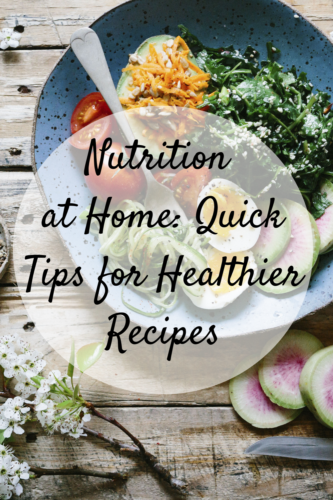
Eating healthy meals and snacks is an important part of a healthy lifestyle. Eating nutritious meals at home will ensure you get the nutrients the body needs to stay strong, energized, and focused. With a few simple tips, home-cooked meals will be as nutritious as possible.
Portion Control
Regarding cooking for health and wellness, portion control is key for healthier recipes. Cooking for the family doesn’t always have to be about making a meal for everyone in the household. Instead of making full-sized meals for each person, try pre-portioning ingredients into smaller sizes. This keeps portions in check for healthy meal servings and reduces food waste for those who don’t eat everything on their plate. Portion control is a small but impactful change that promotes healthier eating habits at home for the whole family.
Choose Quality Ingredients
Choose ingredients carefully when cooking at home by selecting higher-quality options. For example, choose whole grains over processed grains whenever possible and look for leaner cuts of meat, such as chicken breasts or fish fillets, instead of fattier cuts like ground beef or pork chops. Regarding fruits and vegetables, try to choose new options whenever possible rather than using canned or frozen varieties. Fresh produce is often more nutrient-dense than its canned counterparts due to lower sodium levels and fewer added ingredients like sugar and preservatives typically found in canned goods.
Get Enough Protein
Protein builds muscle mass, keeps energy levels throughout the day, and aids digestion. To get enough protein every day, it is important to include high-protein foods. For example, dairy products like yogurt or cheese, legumes like beans, and nuts like almonds are all good sources of protein. Be sure to cook proteins sparingly, as overcooking could reduce their nutritional value.
Focus on Nutrient-Dense Foods
While it’s important to get enough calories each day to fuel the body correctly, it is also essential that those calories come from nutrient-dense foods rather than sugary snacks or processed convenience foods, which tend not to contain many beneficial vitamins and minerals needed for overall health. Add colorful fruits and vegetables to every meal for extra flavor and nutrition.
Stick to Healthy Cooking Methods
How you cook food matters. Whenever possible, bake, sauté, steam, or grill rather than fry food. These methods will decrease fat intake while allowing food to retain most of its original nutritional value. If you need extra flavor, try adding herbs and spices rather than unhealthy dressings or sauces, which add extra calories without providing any nutritional benefits.
Limit Added Sugars and Salt
Too much-added sugar may cause health issues such as diabetes, while too much salt leads to hypertension. Both conditions have serious health implications, so limit added sugars (such as honey) where possible and use salt sparingly while cooking. If a recipe calls for added sugars, try replacing them with natural sweeteners such as dates or applesauce instead. To replace salt, use rosemary, oregano, thyme, basil, and cilantro for flavoring.
Get Creative with Meals
Spending time each week to plan out delicious healthy recipes is great. Make sure you don’t get bored eating the same things daily! Prepare large batches of soups, stews, casseroles, or other dishes so that leftovers are easy for future meals. Look up healthier versions of your favorite recipes online. The chances are good there will be lots of recipes available.
With these quick tips in mind, you’ll be able to create delicious, nutritious meals right at home. Eating healthy doesn’t have to be difficult, just thinking ahead and planning out healthy recipes go a long way toward helping reach nutrition goals.





Leave a Reply